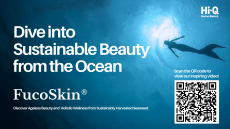Dispatches from in-cosmetics
Japan's Showa Denko on the lookout for EU partner
Exhibiting at in-cosmetics Barcelona this week, Showa Denko representative Atsushi Shibato sat down with CosmeticsDesign-Europe.com to discuss the challenges of cracking Europe after more than 30 years of success in Asia, as well as how it plans to market its’ vitamin C derivative; ‘Apprécier (APPS)’ on the continent.
According to Shibato, of the 10,000 employees working for the company, 2,000 workers have strategically been placed overseas, with twenty sales people
based in Europe.
"All of our R&D is carried out in Japan, where we look for feedback from the market on our ingredients before introducing them to Europe," Shibato tells this publication.
Looking for a Western distributor
Shibato says that when it comes to a distributor, the brand is looking for a company with the technical facilities to support their formulations, that is close to the customer and is ahead of the market when it comes to innovation.
"Many companies promise innovation, but can they deliver it?," the sales manager adds.
Knowledge of Europe’s markets
According to Mr. Shibato, hyperpigmentation and sun damage have become key concerns in Western markets, with demand for related products driven by a desire to reverse sun damage and for the appearance of younger looking skin.
However, he says that consumers with previous skin trouble has led cosmetics manufacturers and consumers to become increasingly attentive to ingredient safety and efficacy in skin lightening.
“Vitamin C has proven efficacies in brightening and anti-ageing but most derivatives in the market have limited penetrability in skin due to the hydrophilic nature of vitamin C.”
“We have utmost confidence in its efficacy and safety, and we hope that it will gather interest among cosmetics manufacturers from Europe and beyond.”
Most vitamin C derivatives are hydrophilic (having affinity for water) but the unique aspect of APPS lies in its amphiphilic nature, as it displays both hydrophilic and hydrophobic properties.
This allows APPS to remain stable in aqueous formulations, yet enables it to pass through cell membranes without any loss in solubility. Due to its moderate hydrophobicity, APPS penetrates effectively into the dermis, the third skin layer, where it is then enzymatically converted to ascorbic acid (vitamin C).























